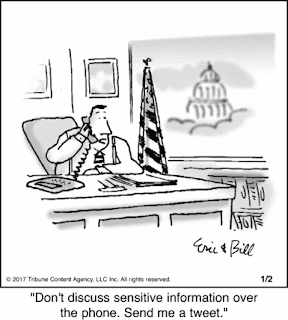If you needed any proof that the compassion train has left the station in the health care debate, you could have heard it in
an interview that aired on NPR on Saturday, March 25th, in which former GOP House Majority Leader Tom DeLay declared,
"Health care is not a right, it's a responsibility."
In fairness, I must admit that I agree with Mr DeLay in part: each of us has a fundamental responsibility to maintain our own health. We know that we shouldn't smoke, drink to excess, take drugs, have indiscriminate sex, or eat an unhealthy diet; that we should exercise, keep our bodies and our environment clean, get enough sleep, and so on. To that extent, we are each responsible for keeping ourselves healthy.
The much-maligned Affordable Care Act (aka "Obamacare") tries to help people keep themselves healthy by establishing a list of "
essential services" that any plan offered in the health care insurance exchanges must provide. Many Conservatives object to this requirement because they don't think the government has any business mandating something that ought to be a personal responsibility. I understand that argument. However, given that when people shirk that responsibility (say, by choosing not to buy insurance), they end up costing
the rest of us money when they have to resort to more expensive emergency care that
we're paying for through higher insurance premiums. Seen in that way, I think it's justified.
In
bold type below are the ACA's ten "essential services" (copied directly from the healthcare.gov website), with my thoughts on why they are important to helping us keep ourselves healthy:
1. Ambulatory patient services (outpatient care you get without being admitted to a hospital).
Sometimes it's not an emergency, but you need to see a doctor for care you can't provide yourself. Think routine care for infections, illnesses, sprains, minor injuries, etc.
2. Emergency services.
In spite of our best efforts to keep ourselves healthy, we can always get injured in accidents. At times like these, we may need emergency help for acute conditions we can't treat ourselves. Unfortunately, emergency services are often abused by people who have no other alternative for receiving care, which raises costs across the board and ties up capabilities needed to respond to true emergencies. A health care system that prioritizes routine services that keep people healthy would almost certainly reduce the use of emergency services for non-emergencies.
3. Hospitalization (like surgery and overnight stays).
Most of us aren't qualified to perform surgery on ourselves when it's required, and surgery conducted by a professional is (justifiably) expensive. In-patient care at a hospital is also expensive, although I suspect If you don't need surgery, you might consider it unnecessary frippery you shouldn't have to pay for ... but when you need it, chances are you
really need it. And you'll almost certainly need insurance to help pay for it*.
4. Pregnancy, maternity, and newborn care (both before and after birth).
When the expectant mother keeps herself healthy (diet, exercise, etc), receives good routine prenatal care, delivers a healthy baby in a safe environment, and that baby receives good postnatal care, both mother and baby will remain healthy and be far less likely to need expensive care in the future.
5. Mental health and substance use disorder services, including behavioral health treatment (this includes counseling and psychotherapy).
Maintaining sound mental health is important for a lot of reasons, one of which is that advocates of unrestricted gun rights often blame the perpetrator's mental problems for violence committed using guns. One would think they would support such care. I can understand an aversion to requiring insurance policies to cover treatment for substance abuse (which is, generally, a personal failing), but if we look at the long term cost to society (in terms of crime, stress on the health care system, and so on), perhaps covering this treatment is worthwhile in the long term.
6. Prescription drugs.
While prescription drugs are difficult to develop and test, allowing the Holy Marketplace to set their price tends to price them well beyond the means of most Real People. I had my own experience with the cost of prescription drugs a while back when my employer shifted us to a "high-deductible" plan and my copay for a medication I take went from about $20 to $1300. Don't get me started on price-gouging with prescription drugs.
7. Rehabilitative and habilitative services and devices (services and devices to help people with injuries, disabilities, or chronic conditions gain or recover mental and physical skills).
There's a good case to be made for providing medical services and devices which speed a sick or injured person's recovery. The faster such people are returned to health, the sooner they can return to work or other productive activity.
8. Laboratory services.
Your doctor needs accurate information to help keep you healthy, so it seems reasonable to have insurance policies cover routine laboratory services and tests.
9. Preventive and wellness services and chronic disease management.
There are things we can't necessarily do for ourselves to keep ourselves healthy ... think things like flu shots and routine immunizations against illness. Don't get me started on the selfish stupidity of the anti-vaccination crowd.
10. Pediatric services, including oral and vision care (but adult dental and vision coverage aren’t essential health benefits).
This one goes hand-in-hand with #4, continuing the maintenance of children's health through adolescence. Helping children and adolescents stay healthy breeds healthier adults who are less likely to need more expensive health services.
There are two more "additional benefits" the ACA requires plans to provide:
Birth Control Coverage; and
Breastfeeding Coverage. I have to admit that I'm of two minds on these.
I can see that requiring insurance plans to cover birth control has the benefit of helping limit unwanted pregnancies and all the medical, and socioeconomic problems that go along with them; on the other, it may force insurance providers to be a party to an action to which they have a religious objection**.
As for "breastfeeding coverage," I don't understand why it couldn't be included in the "Pregnancy, maternity, and newborn care" requirement we discussed in #4 above. Making it a separate requirement just complicates things. And if you're going to require insurance to cover the cost of breast pumps, why not require it to pay for formula for women who don't choose to breastfeed?
Oh, and one last thing: why on earth do we require separate insurance for vision and dental care? I suppose there's someone with a PhD in medical economics who can explain it in terms of arcane economic theory, but I just don't think it makes any sense.
I don't pretend to have all the answers to our health care problems ... I'm just a blogger who reads and thinks a lot, and who has to figure out how to keep his family healthy in the midst of world-class health care most Americans can't afford. All I know is that President Obama and his allies actually tried to bring American health care into the 21st century. The ACA is far from a perfect plan, but it's not the cataclysmic disaster that the GOP tries to portray. And speaking of the GOP, they had seven long years to come up with either a new plan more to their philosophical liking, or tweaks that would help fix the shortcomings of the ACA. They did neither. All they did was bitch and complain and hold useless show votes to repeal the ACA. They have forfeited the right to be taken seriously as a governing party.
Have a good day. Stay healthy ... you can't afford not to.
More thoughts tomorrow.
Bilbo
* Unless your last name is "Trump," "Rockefeller," "Gates," "Buffett," or something similar.
** My personal opinion is that people have no business imposing their religious beliefs on others, but not everyone sees it the way I do.


















































